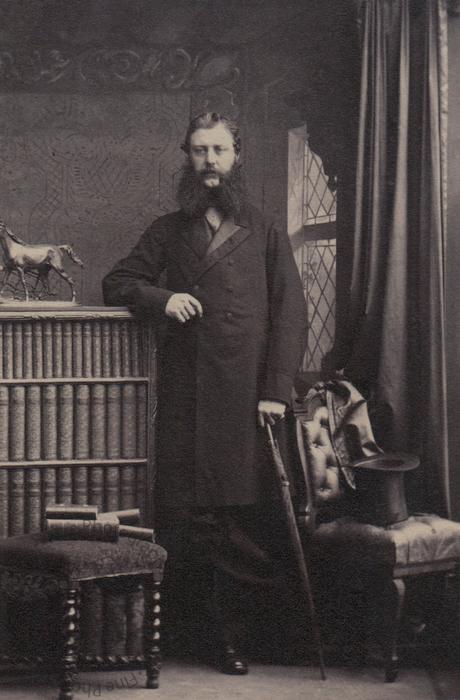Lieutenant Walter Hamilton Twemlow
(1830-1873)
4 November 1862
Volume 9, sitting number 12,174.
[The sitter is identified as ‘Hamillton Twemlow Esq. / 27th Inniskillings’ in the Silvy daybooks.]
Born on 29 April 1830, Walter Hamilton Twemlow was the only son of Reverend William Hamilton Twemlow, Rector of Babcary in Somerset, and his wife Ellen, only daughter of Reverend Joseph Hordern.
He was baptised at High Legh in Cheshire on 9 May 1830.
He joined the army (by purchase) as an Ensign in the 34th (Cumberland) Regiment of Foot in March 1850. In July 1852 he became a Lieutenant (by purchase) and in January 1854 he transferred to the 27th (Inniskilling) Regiment of Foot. He was promoted to the rank of Captain in March 1863.
He never married.
Captain Walter Hamilton Twemlow died, aged 42, at Southampton on 13 February 1873, leaving an estate valued at £200.
‘27TH (INNISKILLING) — We record the death, on Thursday last, of Captain Walter Hamilton Twemlow, of this regiment, now stationed at the New Barracks, Gosport. Captain Twemlow was on leave, and at the time of his death was staying at his father’s residence, Southampton. The funeral took place Feb. 18. The deceased was senior captain of the 27th, and was held in the highest esteem by all ranks. He was for eight years adjutant of the corps, and gained his company March 15th, 1863. He served with his regiment during the Indian mutiny, and received a medal. The remains of the gallant officer were interred in Haslar Cemetery, with full military honours. The whole of the regiment followed, and although most of the officers were absent on leave in different parts of the country, nearly all returned to pay the last tribute of respect to their departed comrade.’ A detailed description of the funeral follows. The obituary concludes: ‘The coffin (which was of polished oak with brass mountings0, was borne to its resting place by six men of the regiment, four of the officers acting as pallbearers. […] After the service three volleys were fired over the grave, and this concluded the imposing ceremony. A quantity of beautiful camellias were thrown into the grave by ladies and officers’(The Broad Arrow, 22 February 1873).

